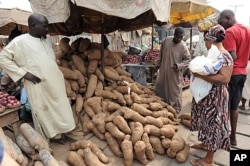The West African yam is receiving some long over-due attention in what has been termed one of the most ambitious efforts ever to improve the lives of farmers in the region. The International Institute of Tropical Agriculture, IITA, along with a host of partners announced a new initiative this week. It aims to dramatically boost yam productivity and double the incomes of three million yam farmers in west Africa.
Dr. Robert Aseidu, director of research and development at IITA in Ibadan, Nigeria, explains the initiative’s objectives.
“The project will increase productivity of the yam by taking improved varieties that are high yielding and have high levels of pest resistance, but still have very good food quality,” he said. “The seed material of this variety will be made available to the farmers.”
Aseidu said the farmers would also be provided with training on how to keep the seed material healthy.
“A diseased seed actually reduced the productivity at least by 50%,” he says.
The IITA official says yam has been known as a staple crop for West African coastal countries since the beginning of time. Nigeria and Ghana are leading producers of the crop which is high in carbohydrates, and has protein levels equal to that of the white potato. Yam is also high in beta-carotene and vitamin A.
The IITA project will also help farmers manage the fertility of their soil, so they don’t have to cultivate new areas every year.
Women comprise a large percentage of farmers in developing countries and face many challenges in providing enough food for their families. Gender inequality is a big factor in agricultural production and Aseidu says this issue will also be addressed under the new initiative.
“We are particularly interested in empowering women. First, you’ll find out that women at the moment are the ones who are more on the over-used soil because these are the soils that are closest to the homestead,” said Aseidu.
He added, women farmers do not have easy access to mechanized preparation of the land, or to labor.
“We are going to specifically show them how to improve the fertility of their soil and get better use of the land that is closer to their homestead,” he explains.
The IITA project will also provide women farmers with access to high yielding varieties of yam, and introduce new technologies that will help with storage and processing of food.




